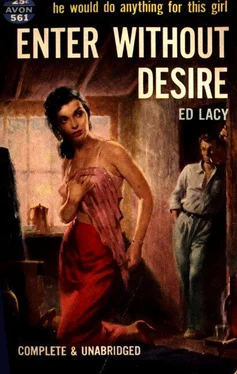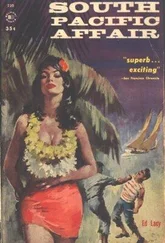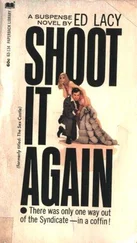Ed Lacy - Enter Without Desire
Здесь есть возможность читать онлайн «Ed Lacy - Enter Without Desire» весь текст электронной книги совершенно бесплатно (целиком полную версию без сокращений). В некоторых случаях можно слушать аудио, скачать через торрент в формате fb2 и присутствует краткое содержание. Жанр: Старинная литература, на русском языке. Описание произведения, (предисловие) а так же отзывы посетителей доступны на портале библиотеки ЛибКат.
- Название:Enter Without Desire
- Автор:
- Жанр:
- Год:неизвестен
- ISBN:нет данных
- Рейтинг книги:4 / 5. Голосов: 1
-
Избранное:Добавить в избранное
- Отзывы:
-
Ваша оценка:
- 80
- 1
- 2
- 3
- 4
- 5
Enter Without Desire: краткое содержание, описание и аннотация
Предлагаем к чтению аннотацию, описание, краткое содержание или предисловие (зависит от того, что написал сам автор книги «Enter Without Desire»). Если вы не нашли необходимую информацию о книге — напишите в комментариях, мы постараемся отыскать её.
Enter Without Desire — читать онлайн бесплатно полную книгу (весь текст) целиком
Ниже представлен текст книги, разбитый по страницам. Система сохранения места последней прочитанной страницы, позволяет с удобством читать онлайн бесплатно книгу «Enter Without Desire», без необходимости каждый раз заново искать на чём Вы остановились. Поставьте закладку, и сможете в любой момент перейти на страницу, на которой закончили чтение.
Интервал:
Закладка:
For many months I didn't do a thing but sleep a lot, lounge around the apartment, write to Bonard, tell myself that “tomorrow I'll start sketching, maybe buy clay...”
Mary Jane gave me a wise, patronizing look, as though I'd just been released from a nut-house and had to be humored. One of the current myths of the time was that all soldiers needed “adjustment and readjustment.” It was true I was trying to find myself, but the war had nothing to do with it.
I didn't see Sid for awhile and when we did meet he had changed, no longer wanted to slug somebody after a few shots to demonstrate his punch. He was about to marry a “nice” young girl and work in his in-law's big hardware office. He had paid a thousand under the table for a small apartment in the Village, was going to art school at night, suggested I do the same under the G.I. Bill.
I finally purchased some clay and tools, tried my hand at carving wood—for some stupid reason—and became thoroughly discouraged. I felt too unsettled to do anything for any length of time. I was sending Bonard CARE packages and he wrote once, but his French scrawl was too much for me.
1946 slipped by and we were broke. In '47, Mary tried to get work in an aircraft instrument factory, but they weren't hiring women. She took out her anger with a week's drunk, being sick most of the time, then went back to office work. She began making cracks about me getting off my rear—we couldn't live on her pay—and of course she was right.
Kimball was opening her own agency, having rooked Barrett out of two of his best accounts, and gave me a job doing layout. Little things annoyed me, like having to shave every day, wear a fresh shirt and tie each morning... I didn't have the heart any more for this rat race. I gave it up after a month and went back to my old real estate office, and into the soft routine of collecting rents. With apartments as hard to find as uranium, people were paying their rent promptly, not asking for repairs, so the job was even more of a comfortable rut than before. Although with no repairs, the petty graft was out.
I spent a lot of time at Sid's place, sometimes making a pest of myself. I mean, after all, they only had a two-room place. And if I didn't come home till early morning, or stayed out all night, Mary J. never complained, and that made me feel like a heel. Sometimes I'd try to be a good husband to her, but no dice. I always had this restless feeling, as though waiting for something to happen. And seeing the headlines didn't make me feel any better. Seemed to me the war had been a waste of time, the Nazis were being released as though killing of thousands of people had been as dangerous as passing a red light. Everything had been a waste of time, so far, especially my life.
I got a sudden desire to go home and, to my surprise, Mary thought that was a good idea, and when I got my vacation, I went back to Kentucky.
My answer wasn't there.
Somehow I expected a big change, but nothing had changed, it was like stepping back into my life. Mom looked the same, as if she had grown as old as she ever would while she was young. Pop still looked as though a light breeze would carry him off. I had a new sister who was five years old, the mill was still the mill. Home was still a shack—a shack with a radio and electric toaster and even an electric heater. My oldest brother had left part of his toes in the cold of Dutch Harbor, and another brother had decided to stay in the army and was in Japan.
I was still glad to get away from home.
When I returned to New York, Sid told me he had heard from a friend in Paris that Bonard had died. That was a shock, a kick in the heart. The death of this old wino, this great liar, really upset me. Over a brace of drinks I took stock of one Marshal Jameson and the inventory wasn't much. Bonard's death made me realize life was rushing by and I was still not doing anything I wanted to, cared about. I was getting past the “young man” stage and it was about time I stopped being a bum.
I staggered home about three in the morning, sat on the bed and awoke Mary, told her, “Baby, this is all cockeyed—been wrong from the start. No sense holding on to a vacuum. I want out.”
“You mean, we should separate?”
“That's it.”
“Will you give me a divorce?”
“Of course. That's the best thing I can give you.”
“Marsh,” she asked slowly. “Are you sure it won't... hurt you?”
“Be good medicine for the both of us. When do you want to see a lawyer, get this going and...?”
“Tomorrow.”
Mary must have seen the surprise on my face. I'd expected a lot of hysterics and screaming, and oddly enough, Mary Jane was still so helpless, I couldn't bring myself to hurt her.
Now she said, her voice low and clear in the still room, “I know we haven't been happy. But I didn't want to be the one to bring things to a head. I knew you'd been through a lot in the war and I felt...”
“Stop it, I wasn't a hero. The war was a breeze for me.”
“Marsh, are you sure you can make out okay—alone? I owe you that, at least.”
“Don't worry about me. God, you don't owe me anything. I'm the one who owes. What will you do?”
“I'll see a lawyer in the morning. I think you should sleep on the couch from now on.”
“Sure. You can have the apartment, everything we have. And thanks for taking all this so... bravely.”
“Marsh, this is as good a time as any to tell you. And I meant to tell you, no sneaky stuff, understand. I met a guy during the war. Alfred...”
“What?”
“Don't be angry, I was all alone and worried and... well, there was Alfred. I still see him. He wants to marry me. He's a mechanic, got his own garage now in Jamaica. I would have told you sooner, but at first you were just back from overseas and I couldn't tell you, and then you seemed so... so... upset, I didn't want to do anything to... make you sick. Marsh, I know it was wrong to...”
“It wasn't wrong. What we were doing was the wrong thing—all this pretending. Marry this Alfred, Mary. Have a houseful of kids and be happy,” I said, getting up.
“Marsh, you really don't mind?”
“Everything's all right.” And that night I slept on the couch and pounded my ear like I was drugged, the best sleep I'd had in years.
Four months later Mary got her final decree and remarried. Alfred was a stocky, plodding-type, joker about thirty-five, and rather handsome, even with a bald dome.
At one of Sid's parties I'd met a Mexican girl, Ofelia, who had ideas about making marionettes and going on TV. She had a good singing voice, wasn't a bad actress. I was to make the marionettes. Ofelia was exciting in a sort of nervous way—I never knew what she'd do next. She had a furious temper and was always biting me. The second time I saw her we ended up between the sheets, and she was nervous there, too. She agreed to be the corespondent in our divorce, and we even thought it was rather clever to go to Mary Jane's wedding, where Ofelia was the center of attraction, by dint of passing out.
I gave up my real estate job and moved into a loft Ofelia had made over into an apartment, without much success. I spent all my time experimenting with marionettes, and couldn't make them. They either looked awful, were out of proportion, or didn't work. Ofelia and I began screaming at each other about money, borrowing from all our friends. Finally we were busted and we both got jobs in a factory, and Ofelia started seeing a psycho-analyst, who advised her to get the hell away from me.
I found a crummy room and was bored by factory work. I decided there wasn't any sense in letting the G.I. Bill go to waste, so I enrolled at N.Y.U. to get my degree. I managed to finish a year, but living on $75 a month was tough, and I always had the feeling college was unreal—a time killer. Somehow it was silly for a guy of twenty-eight to be acting like a school-boy. And what good would a B.A. do me?
Читать дальшеИнтервал:
Закладка:
Похожие книги на «Enter Without Desire»
Представляем Вашему вниманию похожие книги на «Enter Without Desire» списком для выбора. Мы отобрали схожую по названию и смыслу литературу в надежде предоставить читателям больше вариантов отыскать новые, интересные, ещё непрочитанные произведения.
Обсуждение, отзывы о книге «Enter Without Desire» и просто собственные мнения читателей. Оставьте ваши комментарии, напишите, что Вы думаете о произведении, его смысле или главных героях. Укажите что конкретно понравилось, а что нет, и почему Вы так считаете.









